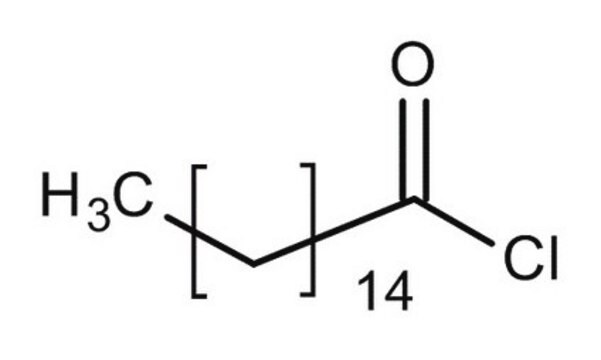367850
Oleoyl chloride
≥89%
Synonym(s):
(9Z)-9-Octadecenoyl chloride, (Z)-9-Octadecenoyl chloride, 9-(Z)-Octadecen-1-oyl chloride, Oleic acid chloride, Oleic chloride, Oleyl chloride, cis-9-Octadecenoyl chloride
About This Item
Recommended Products
Quality Level
Assay
≥89%
form
liquid
refractive index
n20/D 1.463 (lit.)
bp
193 °C/4 mmHg (lit.)
density
0.91 g/mL at 25 °C (lit.)
functional group
acyl chloride
SMILES string
CCCCCCCC\C=C/CCCCCCCC(Cl)=O
InChI
1S/C18H33ClO/c1-2-3-4-5-6-7-8-9-10-11-12-13-14-15-16-17-18(19)20/h9-10H,2-8,11-17H2,1H3/b10-9-
InChI key
MLQBTMWHIOYKKC-KTKRTIGZSA-N
Looking for similar products? Visit Product Comparison Guide
Related Categories
1 of 4
This Item | GF44722469 | GF32887244 | GF99008972 |
|---|---|---|---|
| form wire | form wire | form wire | form wire |
| assay 99.99% | assay 99.99% | assay 99.99% | assay ≥99.95% |
| density 2.7 g/mL at 25 °C (lit.) | density 2.7 g/mL at 25 °C (lit.) | density 2.7 g/mL at 25 °C (lit.) | density 2.7 g/mL at 25 °C (lit.) |
| resistivity 2.6548 μΩ-cm | resistivity 2.6548 μΩ-cm | resistivity 2.6548 μΩ-cm | resistivity 2.6548 μΩ-cm |
| bp 2460 °C (lit.) | bp 2460 °C (lit.) | bp 2460 °C (lit.) | bp 2460 °C (lit.) |
General description
Application
Signal Word
Danger
Hazard Statements
Precautionary Statements
Hazard Classifications
Skin Corr. 1B
Storage Class Code
8A - Combustible corrosive hazardous materials
WGK
WGK 3
Flash Point(F)
339.8 °F - closed cup
Flash Point(C)
171 °C - closed cup
Personal Protective Equipment
Choose from one of the most recent versions:
Already Own This Product?
Find documentation for the products that you have recently purchased in the Document Library.
Customers Also Viewed
Our team of scientists has experience in all areas of research including Life Science, Material Science, Chemical Synthesis, Chromatography, Analytical and many others.
Contact Technical Service










